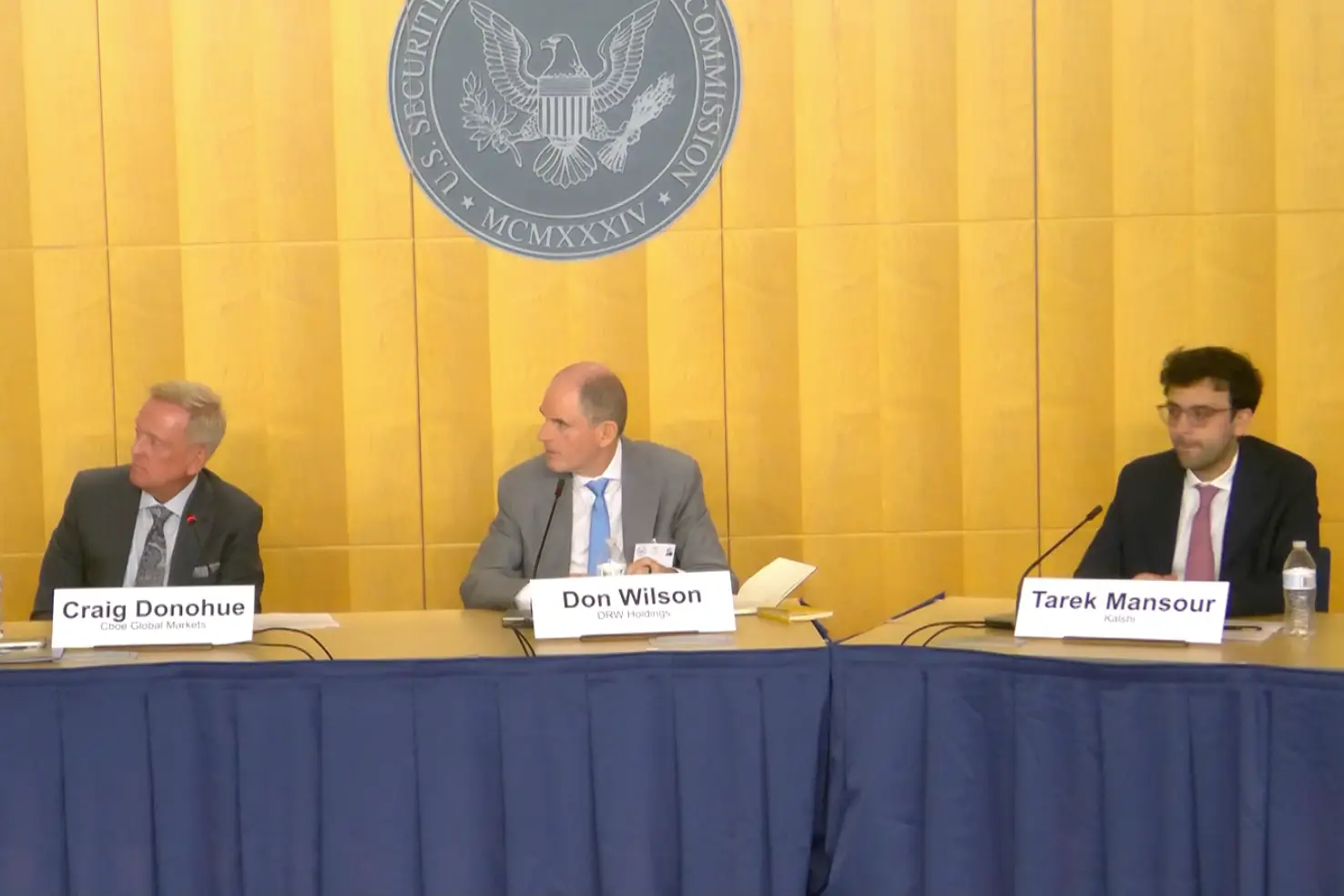The SEC and CFTC held a roundtable on Monday to settle regulatory differences between their agencies. Conflicts in the past have made it more difficult for new financial products to launch. The SEC requires much disclosure up front while the CFTC gives its companies more leeway in deciding how to create guardrails for their products.
Monday’s roundtable was an attempt to “harmonize” the two agencies and create a plan to settle future differences. Former CFTC commissioner J. Christopher Giancarlo (2014-2019) moderated the panel, How We Got Here.
As he questioned his fellow panelists, Giancarlo emphasized how much the SEC and CFTC needed to work together instead of viewing the rival agency’s staff as “competitors.” Cooperation will be especially important for crypto products, which, depending on their functions, could be considered a security or a commodity.
Adena Friedman, the president and CEO of NASDAQ, has been working to approve NASDAQ Bitcoin Index Options. Since it would be based on an option but traded on a securities exchange, it raises complex jurisdictional processes that make it difficult to launch.
The roundtable also included a panel from financial platforms. Both the CEOs of Kalshi and Polymarket were on the panel speaking to the issues they faced from the interagency conflicts.
Breaking news: the handshake did happen @shayne_coplan 🤝 @mansourtarek_ pic.twitter.com/CaGQl4phCG
— Aggie (@BlondiePredicts) September 29, 2025
The full list of panelists included:
- Shayne Coplan, Polymarket
- Craig Donohue, Cboe Global Markets
- Terrence Duffy, CME Group
- Adena Friedman, Nasdaq
- Tarek Mansour, Kalshi
- Arjun Sethi, Kraken
- Jeffrey Sprecher, Intercontinental Exchange
- Don Wilson, DRW Holdings
Prediction markets and innovation
Jeffrey Sprecher, the CEO of Intercontinental Exchange, alluded to the innovation that would be able to take place with better interagency cooperation. He ended his opening remarks by noting that publicly traded companies like his “couldn’t tolerate” some of the “sacrifices” that Shayne Coplan and Tarek Mansour went through to launch their companies.
Craig Donohue, the CEO of CBOE Global Markets, raised the question of why event contracts based on the S&P 500 were regulated by the CFTC instead of the SEC. Donohue suggested a joint resolution board of some kind to resolve those types of questions.
Mansour contrasted the regulatory environment from when Kalshi launched to the current environment in which the prediction market exchange is rapidly expanding. He noted that in 2020, he was seen as a “small corner of the internet” while today, Kalshi is on track for “$40 billion in annualized volume.”
He also hopes that rules will evolve so that approvals process remain immediate, or at least fast enough to respond to customer demands for “daily” or “hourly” markets. Mansour raised concerns that the SEC’s 240-day approval process for a contract on an SEC exchange could prevent a prediction market platform from being sufficiently responsive to customer demands for new markets.
Approvals were contentious
Coplan noted that he had difficulty “mapping” Polymarket, which is built on a blockchain, onto SEC or CFTC regulations. He argued that Polymarket would be a good use case for innovation exemptions, though the issue was controversial. Terrence Duffy, the CEO of CME Group, argued for a “level playing field” that lets institutional companies launch products as rapidly as innovation exemptions would allow.
The CEO of Kraken, Arjun Sethi, argued that the United States was no longer the most innovative financial market in the world. Instead, that regulation was centered in decentralized finance. “We’re already on the cusp of [losing],” Sethi said.
Mansour jumped in to note that he wasn’t looking for an exemption and spent “four years getting regulated.” Instead, Mansour advocated for “a set of rules and laws that are set and that everybody has access to in a fair and equitable way.” He also pointed out that the panel seemed split between an “old guard” and “new guard.”
Mansour noted that rather than building on-chain or offshore, Kalshi went through the regulatory process and received approval under an existing regulatory regime. He hopes for sustainable innovation that can last under regulatory and judicial scrutiny beyond one administration.
Adapting to rapid changes and slow regulation
Companies like Kraken argue that the most innovative products will come from DeFi. There are tokenized products Kraken hopes to test offshore before bringing it under U.S. regulation. They could potentially do so under innovation exemptions from American regulators.
However, companies like CME Group argue that they too should be able to launch products as quickly as companies with innovation exemptions are able to. Some of the products that newer companies have launched were attempted by institutional companies first.
The roundtable brought many critical issues to light. Whether an approval process or regulatory structure evolves to accommodate rapidly evolving products is the next big question for those watching the American regulated space.

























